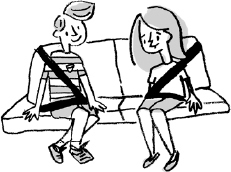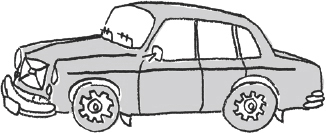Authors: Robyn Parnell
The Mighty Quinn (15 page)
“I don't need to sit in a building to sing. You can say amen to that.” Quinn's mother had a spark in her eyes and a lilt to her voice. “I'm sorry, Quinn. I don't mean to be flippant.”
“That's okay.” Quinn tried not to smile. “You can be flippant all you like, 'cause I don't know what it means.”
“It's one of those words Neally would look up, isn't it? I meant I'm not trying to ignore your question. My reasons ...”
“
Our
reasons,” Mr. Andrews softly but firmly added.
“There are many reasons, some complicated, some clear-cut, why we don't go to a church, any church,” Ms. Lee said. “Some of it is because we don't like the format, the way churches do things. We don't find it helpful, or interesting or meaningful. Some of it is because much of what is said and done by churches we simply don't think is true.”
“Of course, there are other people who think differently,” Mr. Andrews said. “They go to their church or temple, their mosque or meeting house, because they do find it meaningful.”
“Or because somebody makes them go,” Quinn said. “Like Tay. Even Sam and ...” Quinn's knee began to bounce under the table.
“Go on,” Quinn's mother said. “We're listening.”
“Lot of kids at my school go to lots of different churches. But when they talk about it, it's about how their parents made them go to Sunday school
and
youth league and so they had to miss soccer, or how they have to watch boring videos and do stupid crafts. David Greene missed his class's skate party because he has Hebrew school every weekend and can't miss even
one
Saturday.”
“I think I'm coming up with some kind of disease.”
Quinn and his parents turned to look at Mickey, who stood in front of the open refrigerator, looking deeply
concerned. She held her hand over the light on the inside of the refrigerator door, and the skin between her thumb and forefinger glowed red.
“It drives me nuts when she creeps up like that,” Ms. Lee whispered to her husband.
“Cereal or graham crackers?” Mr. Andrews asked Mickey.
Mickey did not answer, but joined her family at the table. “Peppy won't run on his wheel.” Mickey stared pensively at her parents. “He might need hamster vitamins. When I grow up, I'll be a veterinarian for two hours a day, and a barber for the rest. And also have a museum.”
“What happened to being a splinter doctor?” Quinn asked.
“Eh.” Mickey flicked her hand as if to shoo a fly off her head. “May I have more computer time for dessert? My frog made it across all five lanes.” She smiled at Quinn. “My sweet brother, you know how I feel when I'm good at something, darling? I get really rattley.”
Quinn rolled his eyes.
“Mickey, you've still got plenty of computer time left,” her father noted.
“I'll share my time, dear brother. What do you say, sweetie?”
“Ah, foof! I don't want to share it with you.”
“Quinn, you always complain about Mickey teasing
you,” Ms. Lee said. “Now she's being nice to you, and you're acting snotty to her.”
“She's calling me âdarling.' That's not nice, Mom.”
“Even if she is teasing, those are endearing terms. What's so bad about it?”
“I just don't like it,” Quinn huffed. “It sounds like ... like a
husband
.”
“Oh my,” Mr. Andrews said. “We can't have that.”
“I'll share my Christmas candy.” Mickey stuffed her hands into her pockets, withdrew her tightly clutched fists, and thrust her hands toward Quinn. “I have some mints left.” Candy wrappers were visible between her clenched fingers. “Click on one of these.”
“We're raising cyber geeks,” Mr. Andrews sighed to his wife.
“No, thanks.” Quinn stood up. “Okay, I'll share your computer time. Let's check on Peppy, first. Show me what you mean about him not playing on the wheel.”
“My birthday's coming up.” Mickey smiled up at Quinn as they walked down the hall towards the staircase. “Soon I'll be three days older than you.”
“Actually, Mickey, I'm three
years
older than you,” Quinn said.
“Three years?!” Mickey sounded impressed.
“I'll always be three years older than you. I was born three years before you were.”
“Wow,” Mickey said. “That was smart of you.”
IT'S A GROWNUP THING

Quinn waved goodbye to his mother and climbed into the backseat of Neally's car. He ran his fingers over the worn leather of the driver's seatback. It felt cool and smooth, like the skin of a lizard he'd caught in Sam's backyard.
Last night on the telephone Quinn had eagerly accepted Neally's offer of a ride, even as he wondered aloud whether the thing in her driveway was truly a car, and not a misplaced yard ornament. Neally didn't mind Quinn's teasing; it was
she
who'd pointed out the cobwebs in the car's wheel wells to Quinn. She'd whispered into the phone that if her dad gave them a ride to school, it would be one of the few times in her life she'd seen him, or anyone, drive that car.
Quinn couldn't imagine why anyone would have a car and not drive it. But Neally's family didn't seem to have much use for a car. Neally walked to school, her
mother took the train to work, and her father rode his bicycle everywhere, even to the grocery store. But today was special: Mr. Standers had a load of supplies to take to school for their class's field trip.
“This is a cool car. It's so ...” Quinn searched for a better word than âold.' “It's a classic.”
“He means it's old. Yee-ow!” Neally feigned anger when Quinn shoved his book pack into her ribs. “Watch the seat belt!”
“I wasn't sure you'd be on time,” Quinn said. “I didn't think the car would actually start.”
“Me neither,” Neally said.
“Me three-ther,” said Mr. Standers. “I've only driven it twice since we moved here, but it started up like a charm. Right, Neally?”
Neally made hacking noises deep in her throat, as if she were a cat trying to bring up a hairball. “Sure thing, Dad. Just like a charm.”
“It's a 1975.” Mr. Standers stopped the car at the street corner and adjusted the rearview mirror. “These cars are built to last. Change the oil regularly and they'll run forever.”
“Translation: we'll never get a new car in my lifetime,” Neally muttered.
“How will the class be divided up when we get to the Noble Woods?” Quinn hoped to be in Mr. Standers' group, but didn't want to ask. Field trip assignments might be
one of those mysteries that adults weren't supposed to disclose to students.

“I'm not sure, Quinn. The last I spoke with your teacher she couldn't decide between choosing the groups alphabetically, having everyone count off one-two-three, or ...”
“If she still hasn't decided when we get there, don't say anything about which group you want to be in,” Neally said. “If she thinks we want it a certain way, she'll do the opposite.”
“Oh really?” Mr. Standers said.
“I wasn't talking to the front seat.” Neally smiled innocently. “But yes, really.” She looked at Quinn. “It's a grownup thing. They think it builds character, splitting us up and not letting us be with our same group of friends.”
“Being with different people
is
how you make new friends,” Mr. Standers said. “You get to see people in a new way when you're outside of your usual setting. You might appreciate people you never cared for or thought much about when you work together outdoors.”
“Superb point, Dad. I can't wait to appreciate Brandon looking for a bathroom pass in the middle of the woods.”
“All right.” Mr. Standers cleared his throat. “No smart remarks from the peanut gallery.”
“What's the peanut gallery?” Quinn asked.
“It's an elderly person's expression,” Neally said. “The peanut gallery was in the back of a theatre, where the old geezers used to ...”
“Where dey put dem young whippersnappers!” Mr. Standers hunched over the steering wheel, as if he were one hundred years old. He smacked his gums and spoke in a high-pitched creak. “Dang young'uns make too much noise! Dad-gummit, who stole my teeth?”
The 1975 Volvo's peanut gallery wobbled with laughter.
“You can put me with the peanut gallery,” Neally declared. “I don't care what group I'm in. I can work with anybody.”
“Me too,” Quinn quickly offered. “I don't mind being with kids I don't know, even if there's some I'd rather not be with.”
“I read you,” Neally said. “Matt Barker, ditto that.”
“He's not my first choice.” Quinn tried to sound detached, as if he were considering the respective merits of PB&J versus tuna sandwiches. “But it's no big deal.”
“Matt is a classic example of what I was talking about. What's that flapping sound?” Mr. Standers pulled over to
the side of the street. “The tarp is loose.” He unfastened his seat belt, reached out the window, and tugged at the rope that secured a duffle bag to the car's roof. “Okay, where was I? If you got to see a different side of Matt, perhaps by working together to help restore a trail, or ...”
“Watch out,” Neally whispered. “He's using his âmake-the-world-a-better-place' voice.”
“... You might be surprised.” Neally's father glanced over his shoulder and shifted the car into drive. “Matt could be a good friend to you, to anyone, if ...”
“If he were on another planet,” Neally said.
“If he had a personality transplant,” Quinn added.
“All right.” The voice was stern, but Quinn saw that Mr. Standers was trying not to laugh.
“If he wasn't such a complete waste of chromosomes,” Neally continued. “And a total disgrace to human DNA, and a gross example of ...”
“
No
.”
Quinn had never heard that simple syllable spoken with such quiet force. Mr. Standers stopped the car in the middle of the street without pulling over to the curb, and looked in the rear view mirror at his daughter.
“You do not talk about people that way, even if you think about them that way.
Never
. And if you find yourself thinking about someone that way, then you change the way you think.”
Quinn held his breath, waiting for Neally to give her father evidence about Matt. She could tell what happened
at the four square court, and Quinn could add so many other things. Neally stared into the mirror. She said nothing, but never broke eye contact with her father.
“Matt's a strong personality, no argument there. I gather he's been a bully over the years?”
Quinn looked at his shoes, at his seatbelt buckle, out the window, anywhere but in the rearview mirror. Mr. Standers had resumed driving and was speaking in his normal voice, but Quinn did not want Neally's father's caring, perceptive eyes focused on him.
“It's a shame, about Matt. In my experience, people give what they get in that regard.”